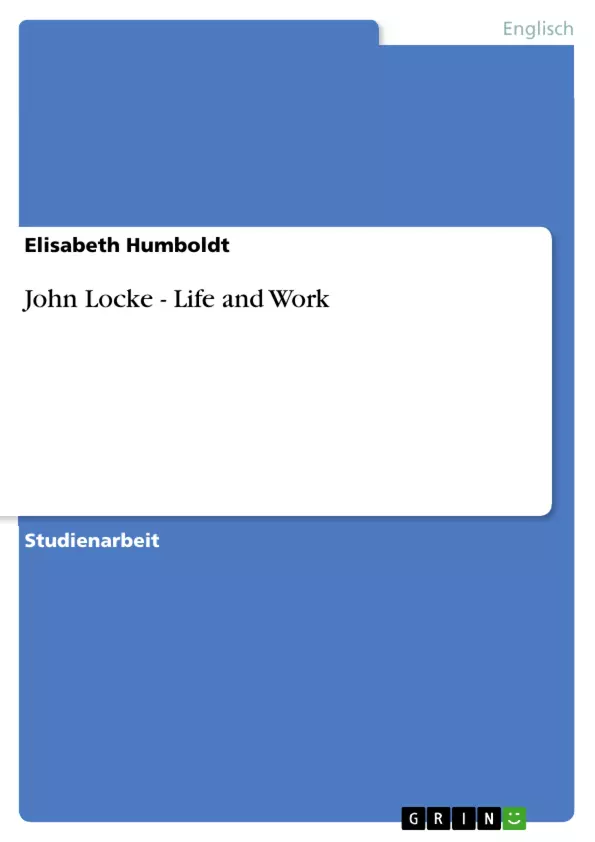When Locke studied in Oxford, he turned from Aristotle and the scholastic philosophy, which was regarded as the basis of the philosophical curriculum of that time, finally to Descartes.
In the course of his career, Locke developed his own philosophical and political ideas which were rooted in the tradition of the English Empiricism (and Pragmatism) with the predecessors William of Ockham and Francis Bacon.
In applying his philosophy to politics or education, Locke was always guided by practical utility. In his reasoning he was never undermining the logical basis for the conduct of practical life.
Locke's political philosphy, especially that which he enfolds in the Second Treatise of Government, highly influenced the formulation of the Declaration of Independence and the Constitution of the USA.
Inhaltsverzeichnis
- Biography
- Locke's philosophy
- Summary of Locke's main works
- Letters concerning Toleration (1689, 1690, 1692, posthumously)
- Two Treatises of Government (1690)
- Essay concerning Human Understanding (1690)
- Thoughts concerning Education (1693)
- The Reasonableness of Christianity (1695)
Zielsetzung und Themenschwerpunkte
Der Text analysiert das Leben und Werk von John Locke. Er beleuchtet Lockes Biografie, seine philosophischen Ansätze und die wichtigsten Werke, die er publiziert hat.
- Lockes politische Philosophie und ihre Einflüsse
- Das Verhältnis von Philosophie, Politik und Religion bei Locke
- Lockes empiristischer Ansatz und seine Bedeutung für die Wissenschaftsentwicklung
- Der Einfluss von Lockes Ideen auf die Entwicklung der modernen Demokratie
Zusammenfassung der Kapitel
Das erste Kapitel beleuchtet Lockes Leben und stellt ihn als einen der wichtigsten Denker der englischen Aufklärung vor. Das zweite Kapitel befasst sich mit Lockes philosophischer Position, die sich von den traditionellen Ansätzen der Scholastik abgrenzt und den Grundstein für den Empirismus legt. Der dritte Abschnitt befasst sich mit Lockes wichtigsten Werken, wie z. B. "Letters concerning Toleration", "Two Treatises of Government" und "Essay concerning Human Understanding".
Schlüsselwörter
John Locke, Empirismus, Aufklärung, Politische Philosophie, Religion, Toleranz, Wissenstheorie, Zwei Abhandlungen über die Regierung, Essay über den menschlichen Verstand.
Häufig gestellte Fragen
Wer war John Locke?
John Locke (1632–1704) war ein einflussreicher englischer Philosoph und Vordenker der Aufklärung, der als Vater des Empirismus und des Liberalismus gilt.
Was ist Lockes wichtigstes politisches Werk?
Sein Hauptwerk zur Politik ist "Two Treatises of Government" (Zwei Abhandlungen über die Regierung), das die Grundlage für moderne Demokratien und die US-Verfassung bildete.
Was bedeutet "Empirismus" bei Locke?
Empirismus besagt, dass alle Erkenntnis aus der Erfahrung stammt. Locke lehnte die Vorstellung angeborener Ideen ab und verglich den menschlichen Geist bei der Geburt mit einem unbeschriebenen Blatt (Tabula rasa).
Welchen Einfluss hatte Locke auf die USA?
Seine Ideen über Naturrechte (Leben, Freiheit, Eigentum) und die Trennung von Staat und Kirche beeinflussten maßgeblich die Unabhängigkeitserklärung der Vereinigten Staaten.
Was forderte Locke in Bezug auf Religion?
In seinen "Letters concerning Toleration" plädierte er für religiöse Toleranz und die strikte Trennung der Aufgaben von Staat und Kirche.
- Citar trabajo
- Elisabeth Humboldt (Autor), 2000, John Locke - Life and Work, Múnich, GRIN Verlag, https://www.grin.com/document/155258



